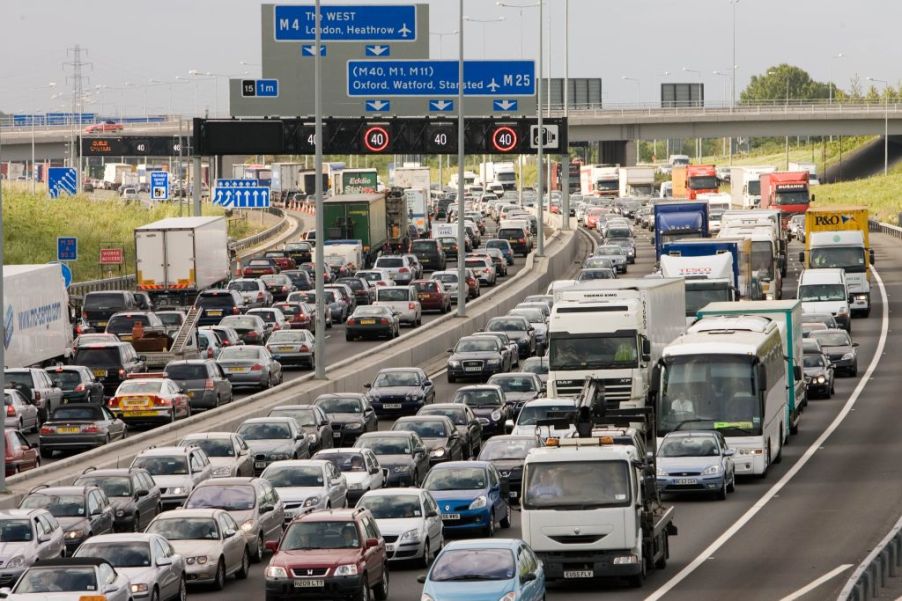
Getting Stuck in Traffic Costs More Than You Think
Sitting in your car stuck in traffic on the way to work can feel awful. Did you know that the costs of that congestion are even worse than you might think? This global traffic problem wastes time and has an economic impact as well. So is there any solution to these traffic problems or are we doomed?
Traffic in U.S. cities
In February 2019, INRIX, Inc., a transportation data analytics company, published a new study, the 2018 Global Traffic Scorecard, which looked at congestion and mobility in 200 cities in 38 countries.
The congestion rankings compared the amount of time spent in traffic during peak commuting times with uncongested times and assessed the time it took to travel one mile in a business district during rush hour. Some of the oldest and densest cities are the ones most affected by congestion.
The worst two U.S. cities were Boston and Washington, DC. In Boston, people lost 164 hours a year. That’s almost seven days. In DC, that was 155 hours. Boston was the only U.S. city that also made the international top ten list of most congested cities. Next were Chicago (with 138 hours), New York City (with 133 hours), and Los Angeles (with 128 hours).
New York City ended up being the U.S. city with the slowest “last mile,” with speeds of nine MPH making the last mile take seven minutes. While Los Angeles is known for congestion, its spread-out area and larger road system reduce congestion. The last mile in L.A. takes drivers four minutes.
The most congested roads
The study also looked at the most congested corridors in these urban areas. The Cross Bronx Expressway (I-95) tops the list again, which it’s done for the past four years. Nine of the top ten busiest corridors are concentrated in the top five most congested cities. However, Washington, DC, does not have any roadways on this list, since its congestion is spread out across the area.
International traffic problems
While Boston was the only U.S. city to make the international congestion list, it was ranked eighth. Moscow has the worst congestion, when weighted for population, with 210 hours lost for drivers. Istanbul, Bogota, Mexico City, and São Paulo round out the top five. Except for Boston, all the ten worst cities were in Europe or South America.
The cost of congestion
Americans on average spent 97 hours a year in congestion, costing them $1,348 a year per driver. That’s a total cost in the U.S. of $87 billion annually. Costs include the value of time for workers and non-workers as well as increased costs for freight transportation. Other costs include increased pollution and higher numbers of accidents.
In Boston, drivers lost $2,291 because of congestion, while drivers in Washington, DC, lost $2,161. Wichita, Kansas, had the lowest cost of congestion of the U.S. cities in the study, with $304 per driver.
“Congestion costs Americans billions of dollars each year. It will continue to have serious consequences for national and local economies, businesses and citizens in the years to come,”
Trevor Reed, transportation analyst at INRIX, said in a press release. “If we’re to avoid traffic congestion becoming a further drain on our economy, we must invest in intelligent transportation systems to tackle our mobility challenges.”
Transportation policies
INRIX suggests that its data and analytics can be used by urban planners to improve congestion problems and reduce costs for drivers. INRIX has found that commuters in most locations spend about half an hour on average commuting to work, and people don’t want commutes that are longer than one hour.
This means that people in congested cities have shorter distance, slower speed commutes than people in less dense and less congested cities. Housing density, housing choices, and infrastructure all affect commuting time totals.
There are cities, including Singapore, Paris, Zurich, Barcelona, and Madrid, that have implemented anti-congestion policies. Efforts range from expensive vehicle ownership fees and congestion tolls, to promotion of public transportation, biking, and walking. These locations have higher-speed commutes even though they are dense cities.
While the study looked at urban congestion, individuals can find ways to escape by making other transportation choices or commuting at off-peak times. In addition, congestion occurs in desirable places to live, so many people decide that putting up with traffic is worth it.


